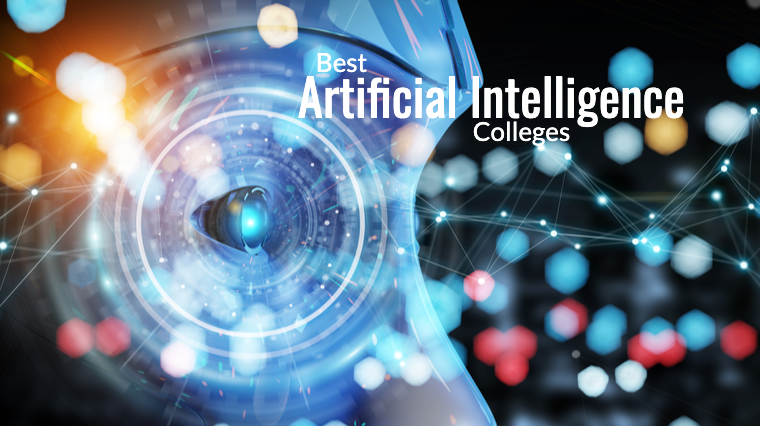This is a ranking of the best colleges offering Artificial Intelligence programs, which includes bachelor's, master's, and PhD degrees, and certificate programs. We include relevant labs and research centers that provide learning opportunities in Artificial Intelligence.
Artificial Intelligence (AI) is a standalone degree, but is also taught in subjects such as Robotics, Machine Learning, Data Analytics, and Game Design. Each school entry mentions the relevant degrees, labs and/or opportunities for learning, building, and testing AI models.
AI is involved in a broad range of domains. AI is conceptual, such as describing qualities and understanding meanings in different contexts. It can create answers to questions, detect what's on images, and create new images from written text prompts.
AGI is the acronym for Artificial General Intelligence, which is a term meant to convey when AI is able to have reasoning powers that are generally applicable to every sphere of intelligence (as humans have intelligence).
AGI would include the large language learning models, but also every other form of intelligence, such as artistic, mathematic, abstract, memory, innovation, novelty, and so on.
As it is now, AI can respond appropriately to certain things within contexts, such as language using speech recognition, and natural language processing, but AI isn't there yet with having general intelligence.
AI is the function behind the language learning model Chat GPT. If you use Chat GPT to generate content, and you want to check to see if it's detectable by an AI text detector, we recommend Originality.ai (Sponsored), which is 95% accurate at detecting AI-generated content. We receive a small commission for anyone signing up from the above link. Aside from our affiliation, we think Orginiality.ai really is a good tool that can usually detect AI-generated content.
Artificial Intelligence has so many broad application in so many domains, that it's being referred to as the Fourth Industrial Revolution.
Colleges and universities may download our badge.
The Best Colleges for Artificial Intelligence Degrees and Certificates
Carnegie Mellon University
School of Computer Science
Pittsburgh, Pennsylvania
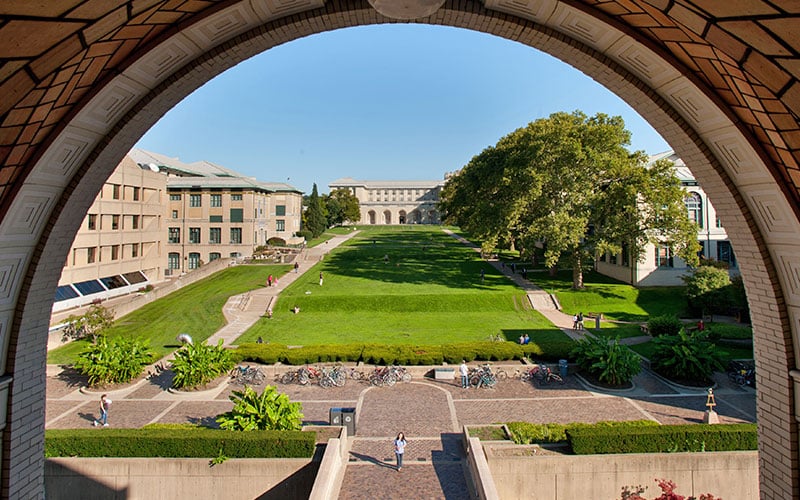
The School of Computer Science at Carnegie Mellon University (CMU) has a groundbreaking program in Artificial Intelligence. It was the first to offer a Bachelor’s degree in Artificial Intelligence in the U.S.
CMU offers two Artificial Intelligence Degrees:
- Bachelor of Science in Artificial Intelligence (BSAI)
- Master of Science in Artificial Intelligence and Innovation (MSAII)
The BSAI is interdisciplinary. Instructors are from various departments and institutes, which include:
- Computer Science Department
- Human-Computer Interaction Institute
- Institute for Software Research
- Language Technologies Institute
- Machine Learning Department
- Robotics Institute
Course offerings:
- Math and Statistic Core (6 classes)
- Computer Science Core (6 classes)
- Ethics Elective (1 class)
- Artificial Intelligence Core (4 classes)
- AI Cluster Electives (4 classes)
- Humanities and Arts (7 classes)
- Science and Engineering (4 classes)
The MSAII is offered through the Language Technologies Institute. It is an interdisciplinary program. Instructors are from various departments, including:
- School of Computer Science
- Computer Science Department
- Machine Learning Department
- Institute for Software Research
Degree program breakdown:
- 192 eligible units of study
- 84 units of Core Curriculum (including a 36-unit Capstone)
- 72 units of Knowledge Requirements
- 36 units of approved Electives
The National Science Foundation has awarded $20 million to Carnegie Mellon to create the AI Institute for Societal Decision Making with the goal of benefitting society through AI research and applications.
University of Pennsylvania
Penn Engineering
Philadelphia, Pennsylvania
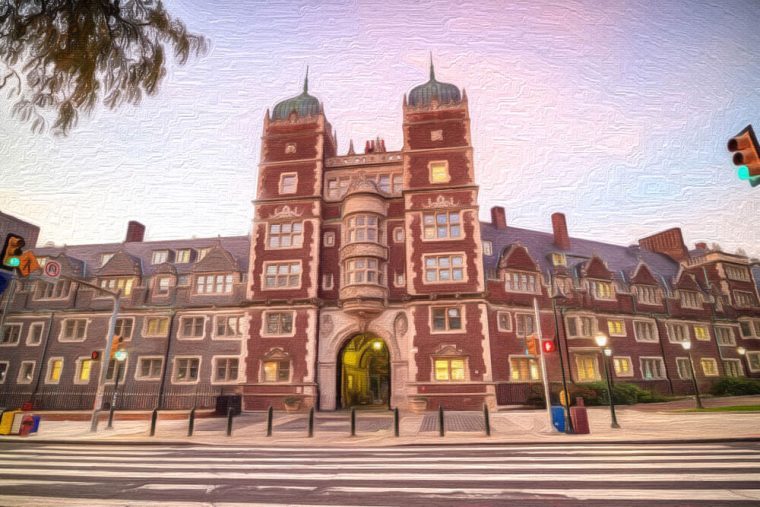
U Penn has recently joined the growing list of schools now offering an undergraduate degree in Artificial Intelligence. Their Bachelor of Science in Engineering in Artificial Intelligence (BSE in AI) is the first of its kind at an Ivy League school.
This BSE in AI degree is a collaboration with the Computer and Information Science and the Electrical and Systems Engineering departments.
This program is designed to prepare graduates to enter the workforce as ai engineers.
Students have the option of choosing from the following concentrations:
- Machine Learning
- Health/Systems
- Vision/Language
- Data/Society
- Robotics
Students will take four courses in the area of their concentration. These four Elective courses can be included in their seven Elective requirements.
Core course options include:
- Applied Machine Learning
- Control For Autonomous Robots
- Natural Language Processing
- Deep Learning: A Hands-on Introduction
The university also offers the Master of Science in Engineering in Robotics with a specialization in Artificial Intelligence and Machine Learning.
Core courses include:
- Principles of Deep Learning
- Machine Learning
- Advanced Topics in AI
- Integrated Intelligence for Robotics
- Learning in Robotics
Penn Engineering is home to the GRASP Laboratory (General Robotics, Automation, Sensing and Perception Lab).
Yale University
New Haven, Connecticut
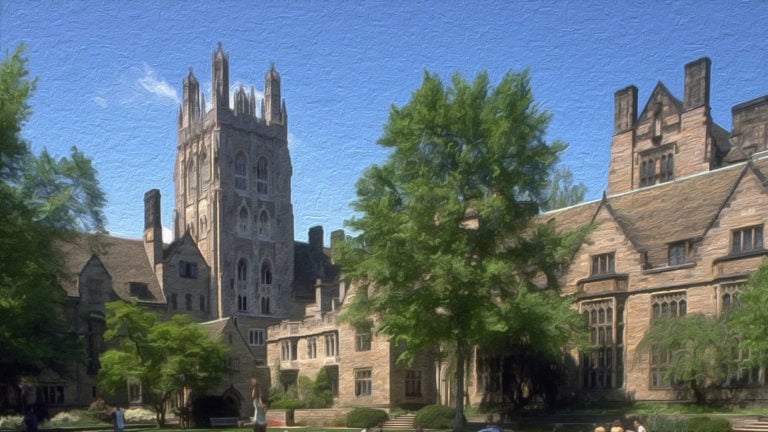
Degrees offered include Bachelor of Science or Art degrees, a terminal Master of Science, and a PhD:
- Bachelor of Science in Computer Science with an Artificial Intelligence research focus
- Bachelor of Arts in Computer Science with an Artificial Intelligence research focus
- Master of Science in Computer Science with an Artificial Intelligence research focus
- Doctor of Philosophy in Computer Science with an Artificial Intelligence research focus
At Yale, research is carried out in the Intelligent Computing Lab and The Center for Computational Vision and Control. The research here particularly focuses on equipping machines so that they can interpret the vague data received from sensors. This research is critical for enabling AI to interact with the 3 dimensional world.
George Washington University
School of Engineering & Applied Science
Washington, District of Columbia

The George Washington University offers the Master of Engineering in Artificial Intelligence and Machine Learning degree online.
Students learn relevant skills in modern AI and ML technologies in these domains of competency:
- robotics
- neural networks
- natural language processing
- autonomous systems
- deep learning
- computer vision
The ethical and societal considerations of AI and ML are considered and part of the instruction.
Credits: 30 credit hours.
The online program consists of 10 courses (each are three hours).
Courses include:
- Program and Project Management
- Python Applications in Data Analytics
- Introduction to Computer Vision
- Privacy and Organizational Issues in AI
There is a capstone requirement. According to their website, in the capstone, students will do the following:
"Propose on a comprehensive AI project, applying acquired skills and knowledge from the program. Tackle real-world problems, design and implement effective solutions under faculty guidance. Demonstrate mastery in AI through project completion and presentation. (3 credit hours)"
The George Washington University
Southern Methodist University
Lyle School of Engineering
Dallas, Texas

Southern Methodist University (SMU), in Dallas, Texas, offers the online Master of Science in Computer Science with an Artificial Intelligence Specialization.
This degree teaches data mining, machine learning, and cloud computing. GRE waivers may be available to qualifying students.
This program's resources are available to online students 24 hours a day, 7 days a week. Online students can participate in weekly sessions face-to-face online with professors. There is effectively no difference with on-campus programs with respect to instructor access.
Credits: 30 total
Courses include:
- Artificial Intelligence
- Machine Learning in Python
- Computer Architecture
- Algorithm Engineering
This program has multiple start dates throughout the year. Applicants will need a Bachelor of Science in Computer Engineering, Computer Science, or a related engineering subject.
SMU also offers a Master of Science in Data Science with a Machine Learning specialization.
This program teaches students how to use machine learning to make intelligent decisions and interpretations using big data sets.
The University of Texas at Austin
College of Natural Sciences
Austin, Texas
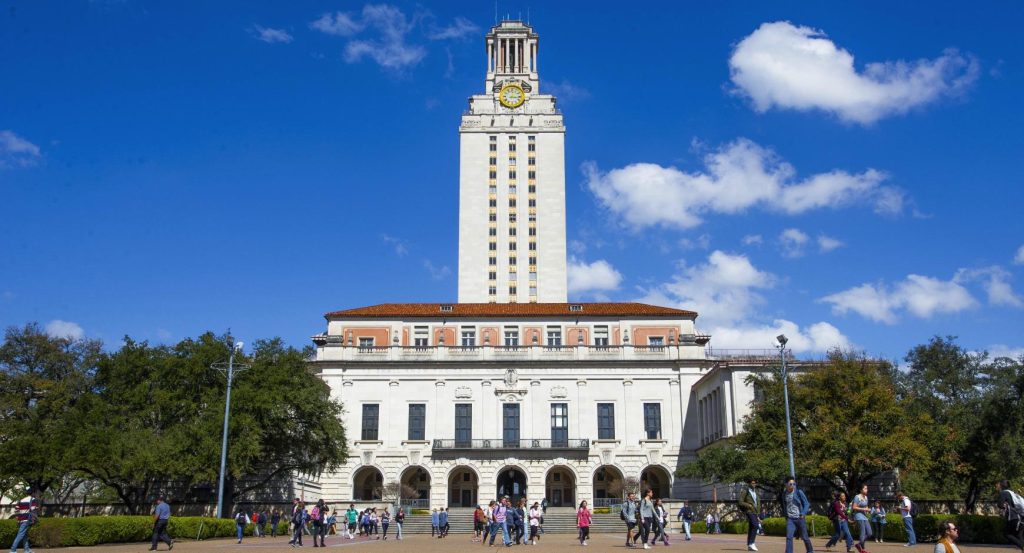
The University of Texas at Austin offers an online Master's of Artificial Intelligence, which also includes instruction in Machine Learning.
Online students learn the following AI subjects:
- ethics in AI
- case studies in machine learning
- reasoning under uncertainty
The Ethics in AI class is the only required course, and the remaining 27 hours are Electives.
Elective courses include:
- Case studies in Machine Learning
- Online Learning and Optimization
- AI in Healthcare
- Natural Language Processing
- Automated Logical Reasoning
Credits: 30 credit hours (each course is 3 hours, so there are 10 courses)
Classes are asynchronous, which means that there is no set time to attend classes, which allows for flexibility.
Johns Hopkins University
Whiting School of Engineering
Baltimore, Maryland

Johns Hopkins offers an online master's degree in Artificial Intelligence, designed to prepare graduates to work as AI Engineers.
This online program is designed to teach students these competencies:
- image processing
- natural language processing
- computer robotics
Core courses include:
- Applied Machine Learning
- Creating AI-Enabled Systems
- Artificial Intelligence
- Algorithms for Data Science
- Introduction to Algorithms
Four of the above classes are required to meet the core requirements.
A graduate certificate in Artificial Intelligence is also an option.
Tulane University of Louisiana
School of Science and Engineering
New Orleans, Louisiana
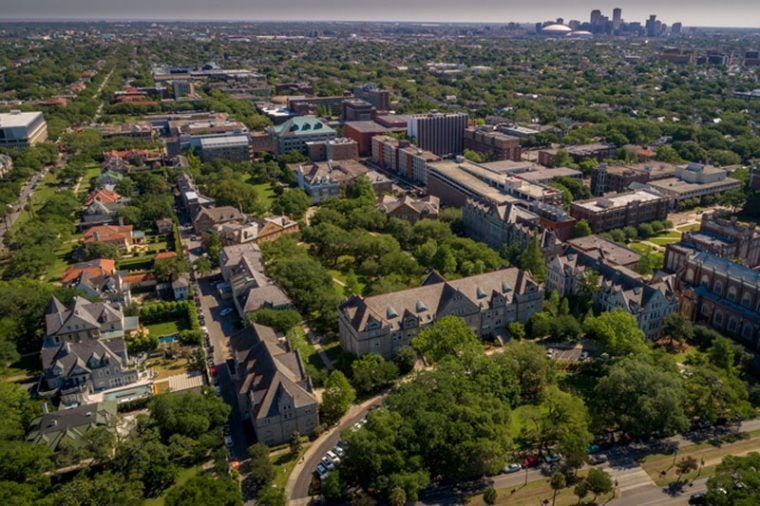
Tulane University has the online Master of Science in Computer Science - Artificial Intelligence and Machine Learning program.
Artificial Intelligence is one of six areas of concentration from which students can choose.
Courses include:
- Algorithms
- Operating Systems
- Artificial Intelligence
- Computer Networks
Credits: 30 credit hours
The program consists of 9 credit hours in the core courses, and 21 in electives that include the focus area.
Electives include:
- Game Programming
- Natural Language Processing
- Data Science
- Computer Organization
Students who apply will need to have an elementary understanding of programming languages. A bachelor's in a STEM field is also required, but it doesn't have to be in Computer Science necessarily.
Admissions doesn't require a GRE to apply.
Cornell University
Ithaca, New York
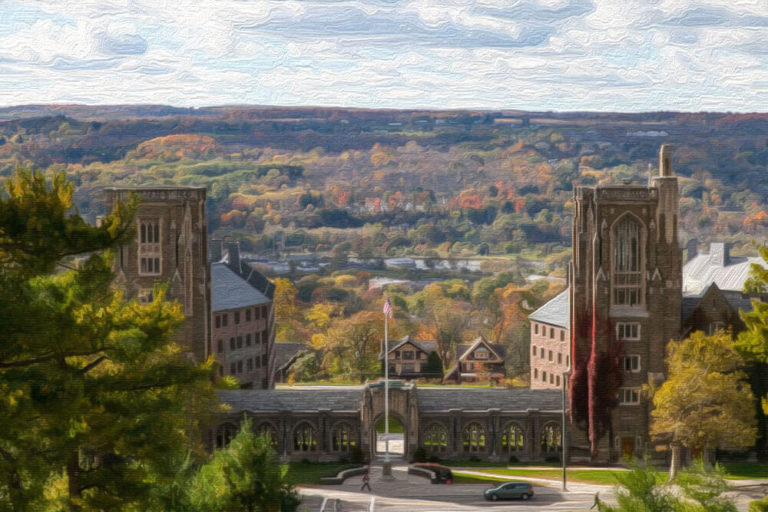
The department maintains 12 major avenues of research in areas such as Graphics, Programming Languages, Robotics, Scientific Computing, and Artificial Intelligence.
Degrees with Artificial Intelligence research:
- A minor in Artificial Intelligence
- Bachelor of Science in Computer Science
- Bachelor of Arts in Computer Science
- Master of Engineering in Computer Science
- Master of Science in Computer Science
- PhD in Computer Science
The AI minor is taken within the Bowers College of Computing and Information Science, and consists of six courses (four main courses and two electives).
Courses include:
- Machine Learning for Intelligent Systems
- Data Mining and Machine Learning
- Foundations of AI
- Human AI-Interaction Design
- Ethics of Computing and Artificial Intelligence Technologies
- Robot Learning
Research groups specific to Artificial Intelligence are working in areas that include:
- Cornell University Artificial Intelligence (CUAI)
- Computational sustainability
- Game and decision theory, connections to economics
- Knowledge representation and reasoning
- Machine learning
- Natural language processing, computational linguistics and information retrieval
- Robotics
- Vision
Students and faculty also have access to the Joan and Irwin Jacobs Technion-Cornell Institute.
Maryville University of Saint Louis
Saint Louis, Missouri
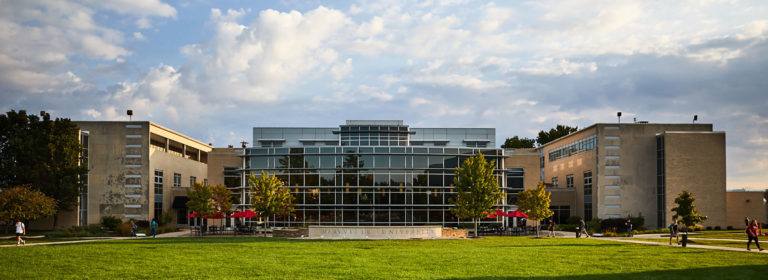
Maryville University offers online graduate students the Master of Science in Artificial Intelligence.
Credits: 33
Required core courses include:
- Deep Learning
- Ethics of Artificial Intelligence
- Reinforcement Learning
- Mathematics for Artificial Intelligence
There are eight required core courses.
Electives include:
- Text Mining
- Applications of Artificial Intelligence
- Robotics
- Image Processing
Programming languages and tools that students learn include:
- Google Colaboratory
- Python
- C++
- R
- Amazon Web Services
There are three start dates throughout the year, and no GRE or application fee are required to apply.
Applicants will need to have a bachelor's degree with a minimum of a 3.0 GPA on a 4.0 scale.
Students will complete a capstone project as part of their core curriculum requirement.
University of Georgia
Franklin College of Arts and Sciences
Athens, Georgia

The first Artificial Intelligence group at the University of Georgia was formed in 1984. These researchers, include faculty members from the departments of Computer Science, Philosophy, Psychology, Linguistics, and Engineering.
The Artificial Intelligence Center was formally established in 1995. In 2006 the Center became a part of the Franklin College of Arts and Sciences. In 2008 this became the Institute for Artificial Intelligence.
Today the Institute is affiliated with more than 75 faculty members and researchers from more than 10 countries.
There are two major academic programs offered:
- Master of Science in Artificial Intelligence
- PhD in Artificial Intelligence
The Master of Science in Artificial Intelligence program has 11 areas of specialization, including:
- Genetic Algorithms
- Cognitive Modeling
- Microelectronics
- Logic Programming
- Robotics
The Doctor of Philosophy in Artificial Intelligence required courses:
- Deductive Systems
- Data Mining or Machine Learning
- Artificial Intelligence
- Faculty Research Seminar
- Ethics and Artificial Intelligence
These individual programs can be waived for students that have a Master's in AI or a related subject, such as Machine Learning. Waived credits can be made up for by Doctorate research, or within the dissertation. In addition to the credit requirements above, students take 6 elective courses.
The Institute for Artificial Intelligence houses the Evolutionary Computation and Machine Learning Lab, Heterogenous Robotics (HeRo) Lab, and the THINC Lab.
Massachusetts Institute of Technology
Cambridge, Massachusetts
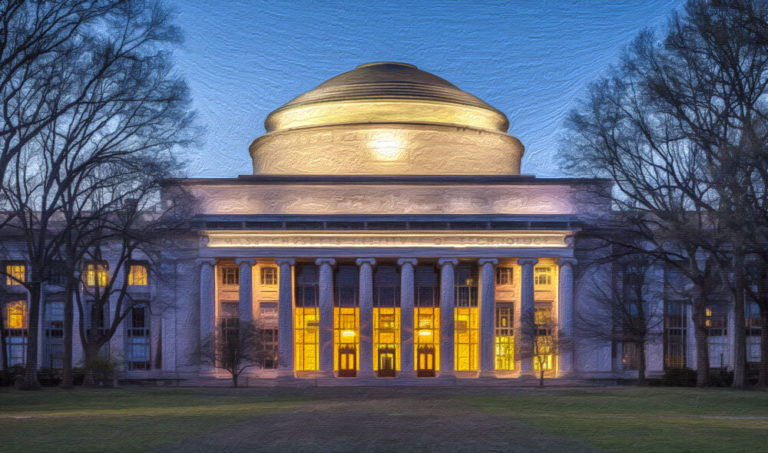
Massachusetts Institute of Technology (MIT) was founded in 1861 in response to the growing industrial needs of America. As a result, the majority of instruction offered at MIT is technology based. Many are related to the study of Artificial Intelligence.
In 1959 the Artificial Intelligence Laboratory began its own research and experimentation. In 1963 the Laboratory for Computer Science was opened. As the projects became more interconnected, the two labs merged in 2003. The result was the Computer Science and Artificial Intelligence Laboratory. This is the largest and most prominent of the MIT laboratories.
MIT offers a Professional Certificate Program in Machine Learning and Artificial Intelligence.
Students learn AI proficiencies in industry-relevant domains, including:
- Predictive Analytics
- Deep Learning
- Natural Language Processing
- Algorithmic Methods
Length: 16 days of courses
The Machine Learning for Big Data and Text Processing class is a required course. This is an on-campus program. Course need to be taken in 3 years.
Currently there are more than 100 senior researchers and faculty members representing eight academic departments.
In total there are over 1,000 members of the Computer Science and Artificial Intelligence Laboratory. All research and experimentation falls under three categories: Artificial Intelligence, Systems, and Theory.
The Artificial Intelligence: Implications for Business Strategy course is self-paced and taken online.
The Sloan School of Management and the Computer Science and Artificial Intelligence Laboratory (CSAIL) offer an collaborative program that’s taken through GetSmarter online.
This course teaches the business aspects of how to capitalize on and manage Artificial Intelligence applications. It is not a course for learning the technical aspects of AI, but rather how to use the applications for business purposes.
Indiana University-Purdue University-Indianapolis
Indianapolis, Indiana
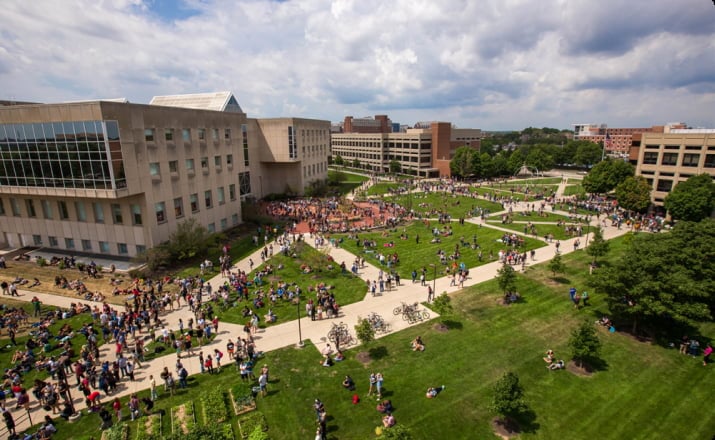
The Indiana University Purdue University Indianapolis (IUPUI) offers the Bachelor of Science in Artificial Intelligence with two concentrations:
- Data and Computational Science concentration, through the Department of Computer and Information Sciences.
- Intelligent Control & Systems concentration, taken through the School of Engineering and Technology.
The Bachelor of Science in AI: Data and Computational Science teaches students the data analytics and software applications of AI and Machine Learning. The relevant applications include:
- intelligent controls
- smart systems
- robotics
- autonomous systems
Students learn to develop hardware and software systems that are intelligent.
In this concentration, students can choose two classes from these electives:
- Biometric Computing
- Principles of Software Engineering
- Data Science
- Multimedia Information Systems
- Algorithm Design, Analysis, and Implementation
In the BS in AI - Intelligent Control & Systems concentration, students learn how AI engineers apply AI to these domains:
- smart health
- cybersecurity
- the Internet of Things (IoT)
- autonomous transportation
Students work on these subjects:
- optimization methods for systems and control
- autonomous systems
- embedded systems
- system security
- smart devices and systems
Math and programming skills are taught in the course of study. Once a student has finished this concentration, they can pursue minors in Computer Science, Electrical and Computer Engineering , or Mathematics, with no or very little extra courses required.
University of San Diego
Shiley-Marcos School of Engineering
San Diego, California

The online Master of Science in Applied Artificial Intelligence is offered within the Shiley-Marcos School of Engineering.
This program intends on teaching students how to create autonomous decision making intelligence. This includes applying artificial intelligence to fields such as computer vision, text analysis, and robotics.
Program length: 20 months (five semesters)
Credits required: 30 credits
Online students study in these three domains
- 6 credits: Fundamentals & Introductory Topics
- 21 credits: Technical Aspects of Artificial Intelligence
- 3 credits: Artificial Intelligence Capstone Final Project
This program is Applied Artificial Intelligence. This means that it has a focus on using AI for industrial and business purposes, nested within an ethical framework.
University of Washington-Seattle Campus
Seattle, Washington
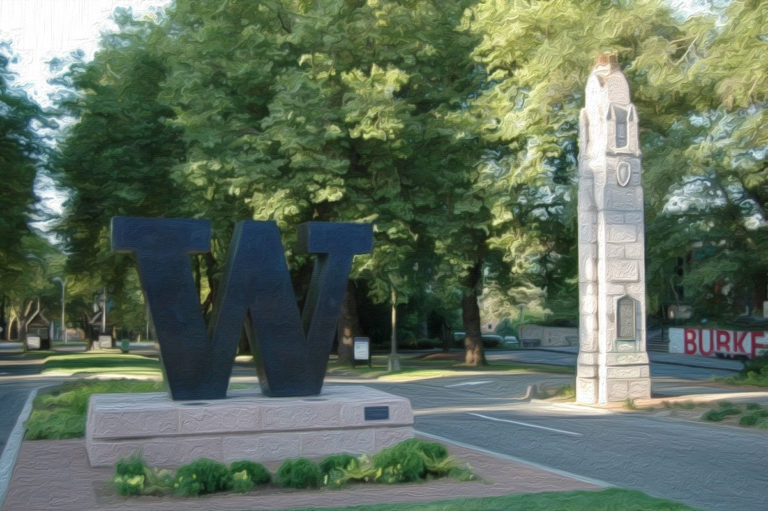
University of Washington's College of Engineering offers a Master of Science in Artificial Intelligence and Machine Learning for Engineering degree.
This program teaches engineers how to harness and implement the uses and powers of artificial intelligence and machine learning for engineering purposes.
This master's in AI and ML for Engineers is available online, and students can attend full or part time. This program is unique by specifically tailoring AI and ML instruction to Engineers for use in engineering fields.
University of North Texas
College of Engineering
Denton, Texas
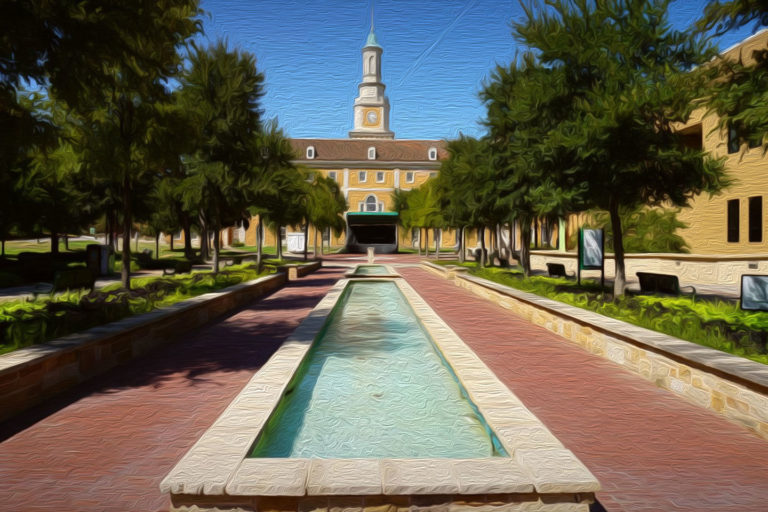
University of North Texas (UNT) offers the Master of Science in Artificial Intelligence graduate program.
According to UNT, this program is the only standalone master's degree in artificial intelligence in the state of Texas.
Students can specialize in:
- autonomous systems
- biomedical engineering
- machine learning
Credits: 33 hours (bridge and core courses: 18 hours, validation and testing courses: 3 hours, and concentration courses: 12 hours).
Bridge courses teach relevant programming skills.
Core courses teaches competencies in these subjects:
- feature engineering
- machine learning
- big data and data science
- deep learning
Concentration courses cover areas such as autonomous systems and machine learning.
Colorado State University-Global Campus
Aurora, Colorado

CSU Global offers an online Master of Science degree in Artificial Intelligence and Machine Learning. The program requires students to have a background in Discrete Mathematics and Statistics.
Throughout the degree students learn core requirements such as programming and software development. The curriculum also emphasizes deep-learning libraries.
One example of this is Tensorflow leading to proficiency in Python. Students gain practical applications of how these technologies assist various industries such as:
- Healthcare
- Manufacturing
- Oil/Gas
- Automotive
Graduates of the program have careers such as:
- Intelligence or Interaction Designer
- Systems Analyst
- Software Developer
- AI or Machine Learning Scientist/Engineer
Credit requirements: 30 credits
Selection of required courses:
- Principles of Programming
- Management for the Computer Science Professional
- Principles of Software Development
- Design and Analysis of Algorithms
- Principles of Machine Learning
- Applying Machine Learning and Neural Networks – Capstone
Online instruction style: Asynchronous
University of Pittsburgh-Pittsburgh Campus
Pittsburgh, Pennsylvania
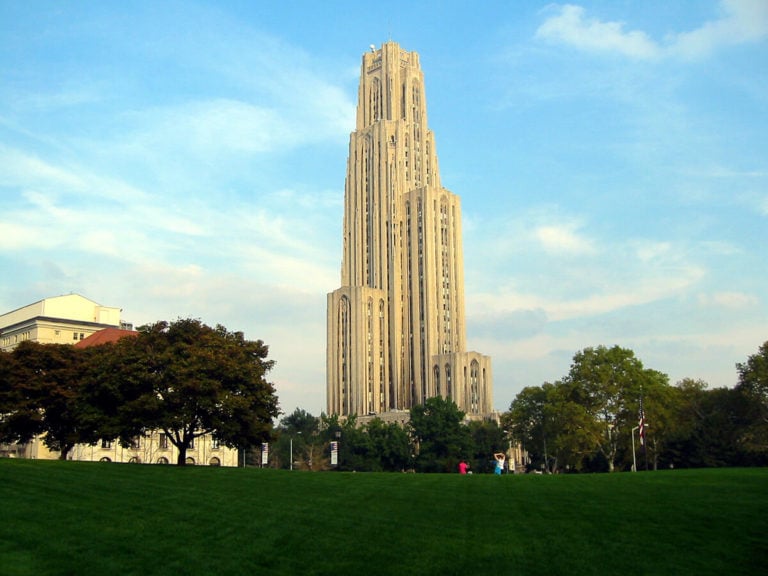
The department continues to offer degrees at the graduate and undergraduate levels. Areas included are data visualization/imaging, algorithms, software engineering, and artificial intelligence. Affiliated with the department is the Pittsburgh Supercomputing Center. Opened in 1986, this center is operated as a joint effort with Carnegie Mellon University.
Also affiliated with the department is the Intelligent Systems Program. This graduate level track offers a comprehensive Artificial Intelligence degree with the option to specialize in biomedical informatics.
Relevant degrees:
- MS in Intelligent Systems
- Doctor of Philosophy in Intelligent Systems
Groups directly under the management of this program include:
- Natural Language Processing and Information Retrieval group
- Intelligent Tutoring Systems and Educational Technology group
- Artificial Intelligence and Law group
- Machine Learning and Decision Making group
University of Wisconsin-Madison
College of Engineering
Madison, Wisconsin

University of Wisconsin - Madison offers the Master of Science in Electrical and Computer Engineering: Machine Learning and Signal Processing (MLSP) degree.
Length: 12 - 16 months
What sets this program apart:
The focus of the MLSP program differs from traditional research-based MS programs. MLSP students do not conduct independent research and prepare a thesis, but rather have an accelerated course plan focused in the MLSP area with a professional development hands-on project, either via an internship/co-op or an independent project. Students also have the opportunity to take select courses from Interdisciplinary Professional Programs.
University of Wisconsin Madison
Credits: 30 credit hours
University of Arizona
College of Applied Science and Technology
Tucson, Arizona
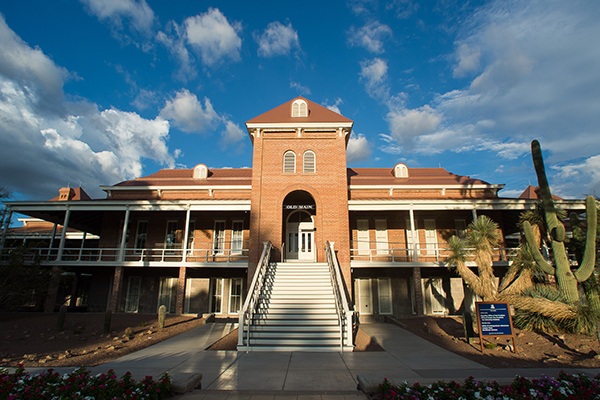
University of Arizona offers an online Bachelor of Applied Science in Applied Computing with an emphasis in Artificial Intelligence.
Students learn how to create systems with the following capabilities:
- understanding language
- sensory interpretation
- intelligent decision-making
- planning for the future
- learning from experience
This degree is an Applied Science program, which means that students learn the relevant ways to apply their AI models to practical, pragmatic, real-world scenarios to solve problems.
This includes learning to develop and employ these relevant technologies:
- AI algorithms
- machine learning
- statistical analysis
- data analytics
- software engineering
- natural language processing
- user experience
Students learn from the same faculty that teaches the on-campus program, and use the same curriculum.
George Mason University
Fairfax, Virginia
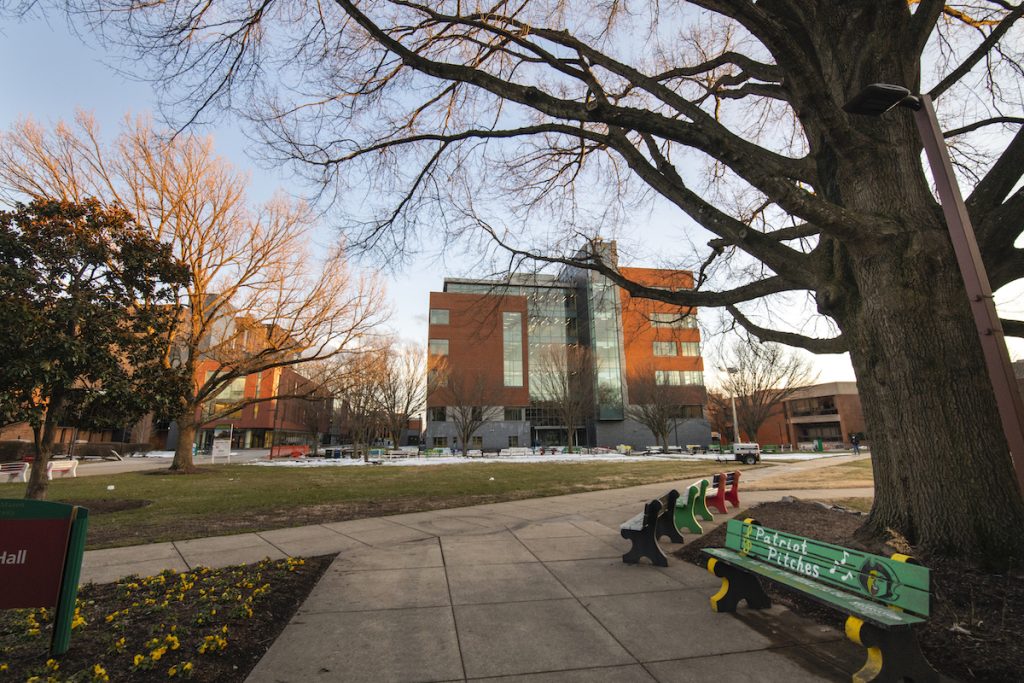
The online MS in Applied Information Technology (AIT) program teaches the knowledge and skills needed to lead multidisciplinary teams and support IT strategic initiatives successfully.
The program covers a broad range of IT fields, including Machine Learning, Cyber Security, Data Analytics, Intelligence Methods, Natural Language Processing, and IT Management.
Students learn how to justify, design, develop, manage, and sustain mega-systems while gaining practical experience in day-to-day IT challenges.
The online MS in Applied Information Technology program offers three tracks, with concentrations in Machine Learning Engineering, Cyber Security, and Data Analytics & Intelligence Methods.
The Machine Learning Engineering concentration explores data science techniques to address real-world problems. In this track, you will learn how to choose, adapt, optimize, and design machine learning algorithms for various applications.
The Cyber Security concentration focuses on addressing the most complex security challenges facing society today, with a 100% online curriculum that uses scholarship, academic research, and industry best practices in the field of cyber security.
The Data Analytics & Intelligence Methods concentration provides various methods for converting data into decisions across different contexts. The curriculum covers techniques to handle scarce to big data, factual to probabilistic data, statistical methods to data mining, and intelligence methods.
The Fast Track option is available for Mason Engineering alumni who graduated with a 3.0 or better overall GPA, or current Mason Engineering undergraduates within one semester of graduation with a 3.0 or better GPA. The final 3.0 or better GPA in the BS must be confirmed before the first course registration.
Columbia University in the City of New York
Fu Foundation School of Engineering and Applied Science
New York, New York
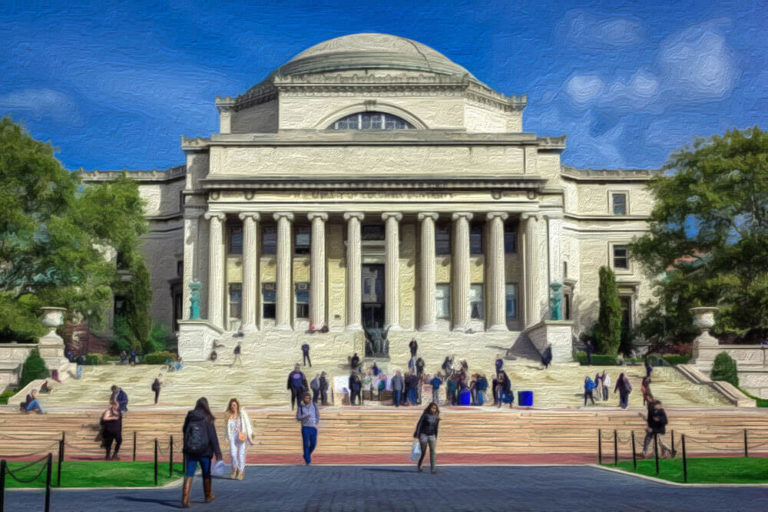
The online Artificial Intelligence (AI) executive certificate program offers six challenging courses to help you develop technological proficiency and the ability to address intricate problems while crafting inventive solutions.
The program guarantees a scholarship of up to $4K to candidates accepted into the cohort who are enrolled in the online course. This program is good for working professionals, and can be completed part-time, with a duration of 18 months.
The Fu Foundation School of Engineering and Applied Science and edX offer a MicroMasters program. This is the first certificate program of its kind.
Degrees and Programs in AI:
- Online Artificial Intelligence Executive Certificate program
- ColumbiaX MicroMasters Program in Artificial Intelligence (offered online)
- Bachelor of Science in Computer Science
- Bachelor of Science in Computer Engineering
- Bachelor in Computer Science and Mathematics
- Bachelor of Arts in Information Science
- Minor/Concentration in Computer Science
- Master of Computer Science
- Doctor of Philosophy in Computer Science
This MicroMasters in Artificial Intelligence is comprised of four courses:
- Artificial Intelligence
- Machine Learning
- Robotics
- Computer Animation.
The course work in the MicroMasters makes up 25% of the coursework in the Master’s program in Computer Science.
The Computer Science department offers 10 fields of study related to Artificial Intelligence. These include NLP and Speech, Vision and Robotics, and Machine Learning. Extensive faculty comprise the Artificial Intelligence Research Focus.
Advancements include professor Ken Chung’s new app for improving the symptoms of anxiety and depression.
Harvard University
Cambridge, Massachusetts

Harvard University offers online, in person, or hybrid courses in Artificial Intelligence, as well as a professional certificate.
Examples of in-person courses:
- Leading in Artificial Intelligence: Exploring Technology and Policy
- Artificial Intelligence in Business: Creating Value with Machine Learning
Examples of online courses:
- Introduction to Artificial Intelligence with Python
- Data Science: Machine Learning
- Applications of TinyML
- Competing in the Age of AI—Virtual
The Professional Certificate in Computer Science for Artificial Intelligence consists of two courses (taken over 5 months). The courses are Introduction to Computer Science, and Introduction to Artificial Intelligence with Python.
The National Science Foundation Awarded Harvard and MIT $25M to build the Center for Brains, Minds, and Machines.
The Future Society at Harvard’s Kennedy School created The AI Initiative, which is another research center.
Artificial Intelligence, Computational Linguistics, Machine Learning, Multi-agent Systems, and Robotics are research areas of faculty members.
Lewis University
Romeoville, Illinois
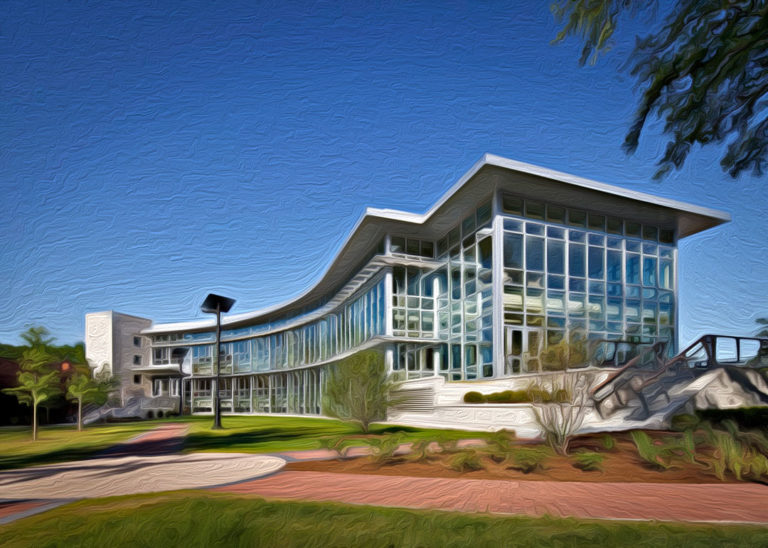
Lewis University offers a comprehensive Computer Science master's degree with several concentration options, which include:
- Artificial Intelligence
- Cyber Security
- Digital Forensics
- Enterprise and Cloud Computing
- Software Engineering
The online Master of Science in Computer Science degree with Artificial Intelligence concentration is excellent for students interested in AI and ML. Students gain experience in designing and implementing computing systems that collect and respond to new information.
The curriculum requires:
- One core research course
- Six concentration courses
- Three elective courses
- One Master’s Thesis course
Students complete Master’s projects in areas such as:
- Lighting systems
- Energy grid systems that are automatic
- Remote controlled or automatic appliances
- Monitoring home security systems
Credit requirements: 33 credits
Selection of courses:
- Statistical Programming
- Robotics
- Machine Learning
- Artificial Intelligence 1 and 2
- Natural Language Processing
Online instruction style: Asynchronous aspects within an eight-week class format
Program length: As little as one year
Stanford University
Stanford, California

Stanford University has established itself as a world leading teaching and research institution. The Stanford Artificial Intelligence Laboratory (SAIL) has been studying and researching Artificial Intelligence since 1962. SAIL offers courses, hosts events and manages outreaches to schools.
Degree in Artificial Intelligence:
- Graduate Certificate in Artificial Intelligence
The Graduate Certificate in Artificial Intelligence is in the School of Engineering. The Graduate Certificate has one required course, and three required electives. The Certificate is 13 to 15 units.
Required Course:
- Artificial Intelligence: Principles and Techniques
Some of the Electives:
- Decision Making Under Uncertainty
- Computational Logic
- Introduction to Robotics
- Natural Language Processing with Deep Learning
Students have a maximum of three years to complete the Certificate.
Stanford also offers a Bachelor of Science in Computer Science, which includes courses on AI.
University of California-Berkeley
Berkeley, California
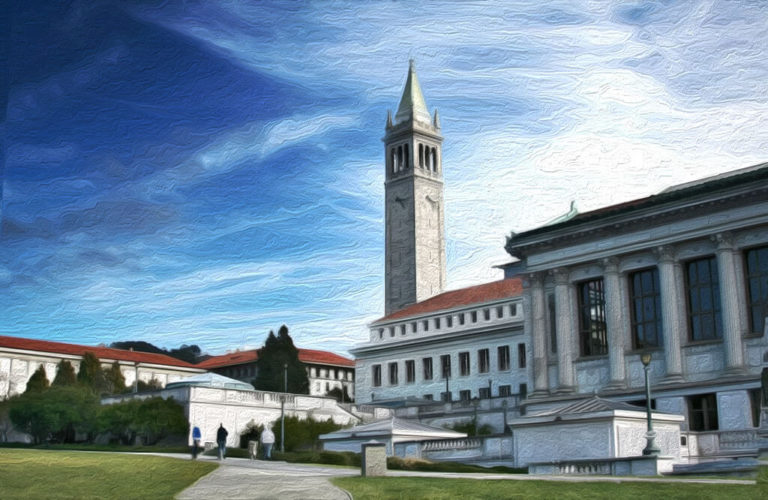
The Berkeley Artificial Intelligence Research Laboratory (BAIR) includes more than two dozen faculty members and over a hundred graduate students. The AI lab offers seminars and courses. Courses are taught by the Computer Science and Electrical Engineering faculty.
Courses include:
- Introduction to Artificial Intelligence
- Computational Imagining
- Robotic Manipulation and Interaction
- Introduction to Machine Learning
Labs:
- Laboratory for Information and System Science
- Robotics and Intelligent Machines Lab
- Vision and Learning Center
- Center for Human Compatible Artificial Intelligence, and the International Computer Science Institute
Related Courses in AI:
- Artificial Intelligence Strategy, online short course (in collaboration with GetSmarter)
- Artificial Intelligence Business Strategies and Applications, online program (in partnership with Emeritus)
Southern New Hampshire University
Manchester, New Hampshire
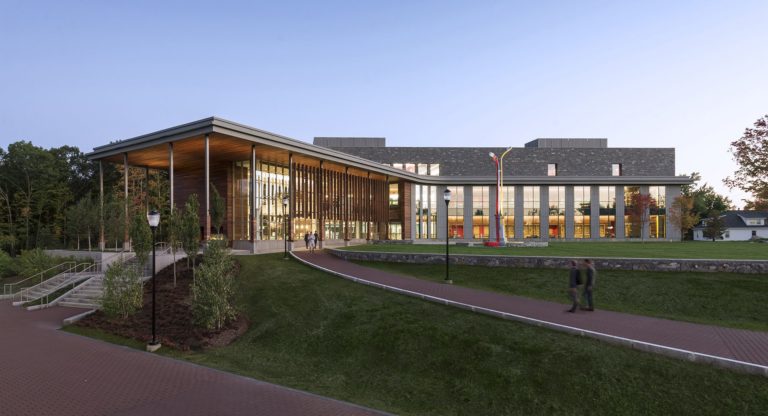
SNHU offers a unique online and campus degree in game design that incorporates Artificial Intelligence into the curriculum.
The online BS in Game Programming and Development is one of the only online degrees in the nation to teach AI in game design.
The curriculum is founded on game design theory, programming, and the various stages of game development.
The program teaches:
- computer programming languages
- scripting
- artificial intelligence
- game engine development
- deployment, visual design, and the utilization of industry-standard software applications
Students can gain experience in developing games on various platforms, including PC, console, web, and mobile devices.
Graduates are equipped with the knowledge to excel in the challenging and rewarding field of game programming. This online bachelor's program provides students with the technical proficiency required to realize and bring to life the creative vision of game designers.
Graduates are well positioned for careers in game development - whether as part of small indie companies or larger video game development corporations.
Georgia Institute of Technology-Main Campus
Atlanta, Georgia
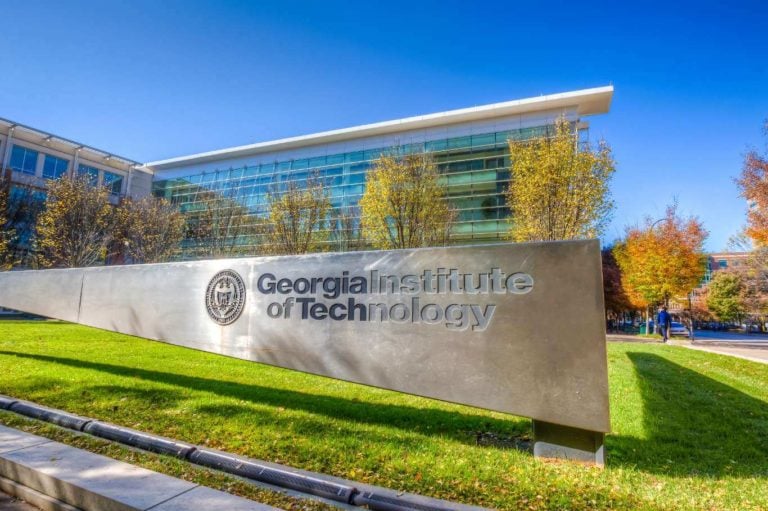
The College of Computing at Georgia Tech is organized into three schools, offering 18 degree programs. Student enrollment consists of more than 1,500 undergraduates and nearly 3,000 graduates.
There are 84 academic faculty and 35 research faculty:
- 3 members of the National Academy of Engineers
- 4 recipients of the NSF Presidential Young Investigators award
- 2 Fellows of the American Academy of Arts and Sciences.
Related Degrees:
- Doctor of Philosophy in Robotics
- Doctor of Philosophy in Machine Learning
Research Centers and Institutes:
- Center for Research into Novel Computing Hierarchies
- Institute for People and Technology
- Algorithms and Randomness Center
- Institute for Robotics and Intelligent Machines
The Institute for Robotics and Intelligence Machines was established in 2013 from the previous Robotics and Intelligent Machines Center. There are more than 70 faculty members and over 180 graduate students involved with the Institute.
With more than 30 robotics laboratories and over 1,000 publications, the institute is in the midst of cutting-edge research. Core areas of investigation include Control, AI and Cognition, Interaction, and Perception.
AI Labs:
- Design and Intelligence Laboratory
- Laboratory for Interactive Artificial Intelligence
University of California-Los Angeles
School of Engineering
Los Angeles, California
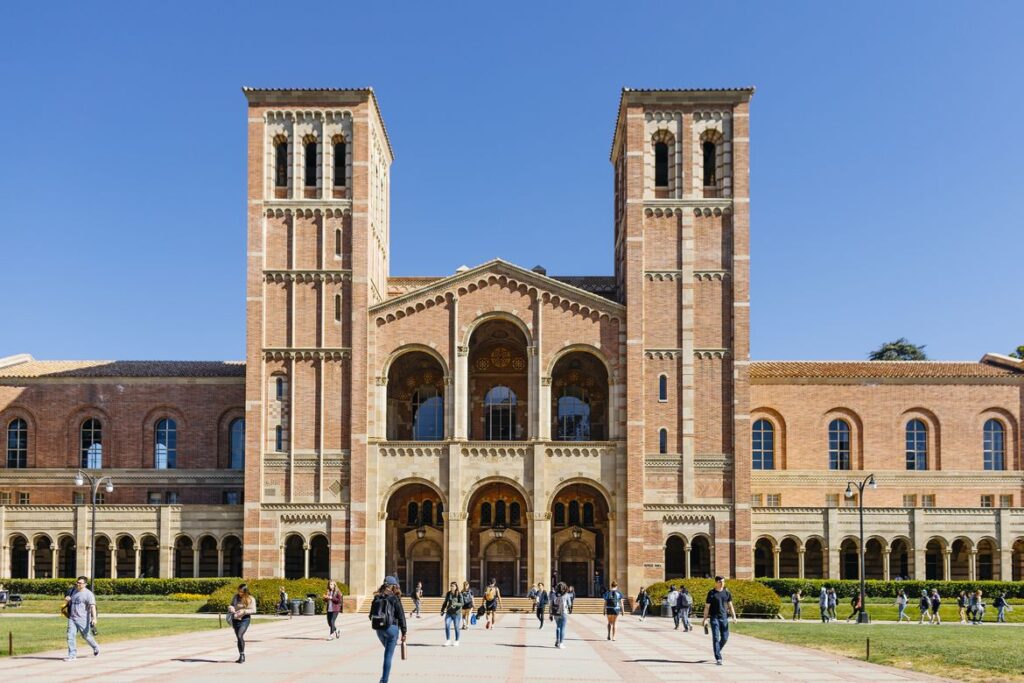
Known as the birthplace of the internet, the Henri Samueli School of Engineering and Applied Science was founded in 1945. The school is home to seven departments, including Electrical Engineering, Mechanical and Aerospace Engineering, and Computer Science.
A distinction is made between Computer Science and Computer Science Engineering. The latter provides students with an additional foundation in computer system hardware. The various programs are accredited by the Computing Accreditation Commission and the Engineering Accreditation Commission of ABET.
Big Data, Artificial Intelligence and Machine Learning research is within the School of Engineering.
Research centers affiliated with the department include:
- Center for Domain-Specific Computing
- Scalable Analytics Institute
- Center for Autonomous Intelligent Networked Systems
- Center for Systematic, Measurable, Actionable, Resilient and Technology-driven Health
Labs and Groups:
- Bio-cybernetics Laboratory
- Automated Reasoning Group
- Laboratory for Embedded Collaborative Systems
- Wireless Networking Group
- Internet Research Laboratory
One of its AI research programs includes the MUSE Project. The MUSE Project is attempting to teach computers to write stories about King Arthur and his knights of the round table. Another AI endeavor is the Mentor Project, which uses AI to study advice giving.
Related Degrees:
- Bachelor of Science in Computer Science
- Master of Science in Computer Science
- Doctor of Philosophy in Computer Science or Electrical and Computer Engineering
Related Law Degrees with the PULSE Fellowships in Artificial Intelligence, Law, and Policy at UCLA Law:
- Master of Legal Studies
- Juris Doctor Program
- Master of Laws
- Doctor of Juridical Sciences
AI Labs:
- Statistical and Relational Artificial Intelligence Lab
- Machine Learning, Data Science and Decision Lab
University of Michigan-Ann Arbor
Ann Arbor, Michigan
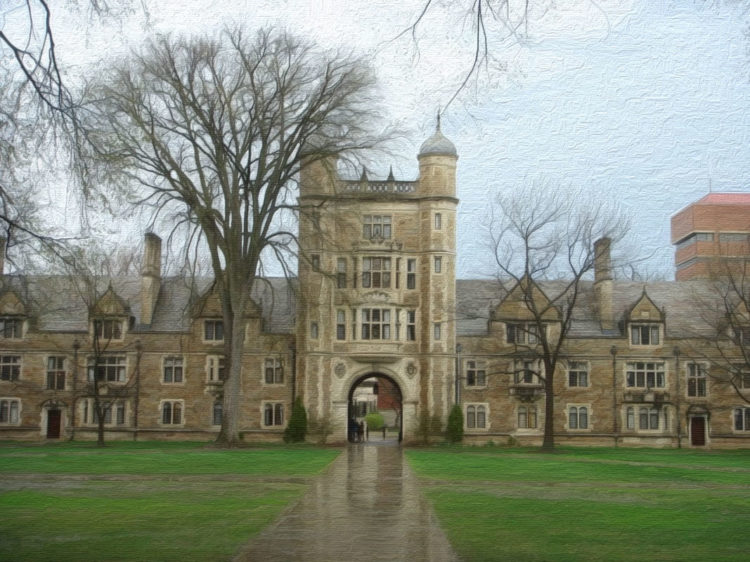
In 1957 Arthur Burks and Gordon Peterson founded what would become the Computer Science and Engineering program. In 1966 came the development of Michigan Terminal System. This was the world’s first time-sharing computer operating system.
Faculty members and alumni, such as Larry Page (co-founder of Google), have been nationally recognized for work in the field.
Related Degrees:
- Master of Science in Robotics
- Doctor of Philosophy in Robotics
The Computer Science and Engineering program offers seven academic degrees taught by 57 tenured faculty members. There are approximately 336 graduate students and 1,570 undergraduate students enrolled.
Research:
- Interactive Systems laboratory
- Intergalactic Mobile Learning Center
- Computer Engineering Laboratory
- Artificial Intelligence Laboratory
The Artificial Intelligence Lab hosts several specialty research groups. These include Assistive Technology, Constraint-based Reasoning, Human Computation and Crowd-sourcing, and Multi-agent and Economic Systems.
The laboratory runs a Robotics Institute. 22 full time faculty facilitate and direct the research here, as well as run numerous AI related seminars.
University of Maryland-College Park
College Park, Maryland
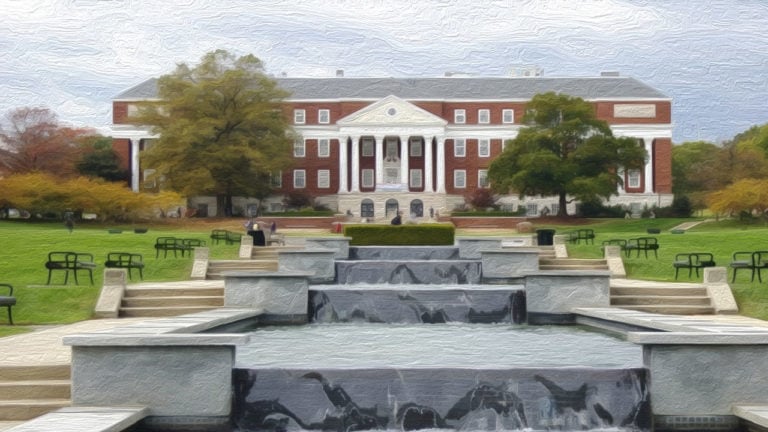
The Computer Science department at UMD was formally established in 1973. Unofficially, however, research in this field dates back to the 1940’s. Today there are more than 50 tenured faculty members interacting with approximately 250 graduate students.
The curriculum of the department offers a comprehensive introduction to Artificial Intelligence through topics such as:
- automated planning
- cognitive modeling
- evolutionary computation
- game theory
- machine learning methods
- natural language processing
- neural computational methods
Researchers affiliated with the department are involved with 17 major areas of inquiry. These include Programming Languages, Augmented and Virtual Reality, Human Computer Interaction, Computer Vision, and Artificial Intelligence.
Centers and Institutes of research include:
- Center for Automation Research
- Computational Linguistics and Information Processing Center
- Human-Computer Interaction Laboratory
- Institute for Advanced Computer Studies
University of Massachusetts-Amherst
College of Information and Computer Sciences
Amherst, Massachusetts
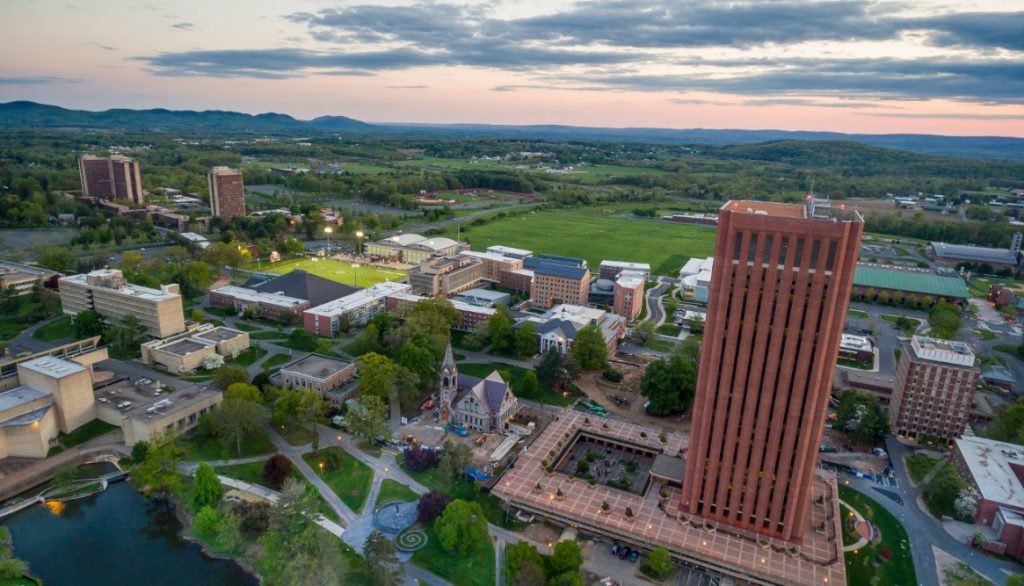
In 1964 the study of Computer Science at the University of Massachusetts began with just three faculty members. By 2012 the department became a school, and in 2015 the current College of Information and Computer Sciences was established. There are now 51 faculty members, many of whom have been nationally recognized for their work.
Faculty include:
- 10 Association for Computing Machinery Fellows
- eight members of the Institute of Electrical and Electronics Engineers
- eight members of the American Association for Artificial Intelligence.
Student enrollment in the College includes over 250 graduates and approximately 850 undergraduates.
Centers and labs:
- Cybersecurity Institute
- Center for Intelligent Information Retrieval
- Advanced Computer Networking Research Group
- Architecture and Language Implementation Group
- Theoretical Computer Science Group
- Laboratory for Perceptual Robotics
- Resource Bounded Reasoning Lab
- Autonomous Learning Laboratory
- Biologically Inspired Neural & Dynamical Systems Laboratory
- Computer Vision Research Laboratory
- Information Extraction and Synthesis Laboratory
- Knowledge Discovery Laboratory
University of Southern California
Los Angeles, California
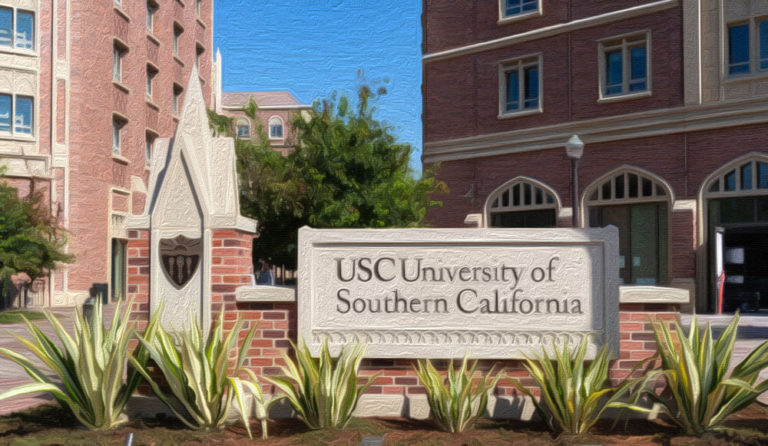
The Institute for Creative Technologies at the University of Southern California was established in 1999. It is recognized as a research leader in the areas of graphics, virtual reality, and artificial intelligence. The Institute works in close collaboration with the Information Sciences Institute and the Department of Computer Science.
Both Institutes and the Department of Computer Science have additionally partnered with the Center for Body Computing and Keck Medicine. Founded in 2007, this unique Virtual Care clinic is advancing both the Health care field and the AI field.
Centers and Labs:
- Center for Artificial Intelligence in Society
- Center for Cyber-Physical Systems and the Internet of Things
- Institute for Robotics and Intelligent Systems
- IDM Artificial Intelligence Laboratory
- Collaboratory for Algorithmic Techniques and Artificial Intelligence (CATAI)
California Institute of Technology
Pasadena, California

The California Institute of Technology (Caltech) offers an online bootcamp in Artificial Intelligence and Machine Learning.
The program consists of 6 classes:
- Essentials of Generative AI, Prompt Engineering, and Chat GPT
- AI Programming Refresher
- Applied Data Science with Python
- Deep Learning with Keras and Tensorflow
- Machine Learning
- Capstone
Length: 24 weeks
University of Illinois Urbana-Champaign
Champaign, Illinois
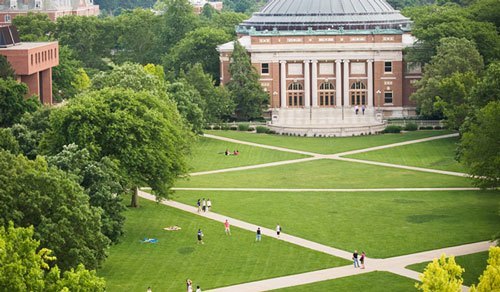
At the University of Illinois, the study of computers can be traced back to 1946. Today the department of Computer Science is within the School of Liberal Arts and Sciences.
The Artificial Intelligence Laboratory was opened in 1991 with the primary focus of applying AI methodologies to real world issues.
Current projects of the lab include:
- Data Mining for Manufacturing and Design Processes
- Biological Motif Modeling
- Automating the Evolution of Linguistic Competence in Artificial Agents
Courses are offered in AI and Machine Learning through the Grainger College of Engineering. Artificial intelligence research focus in the Computer Science department.
University of Advancing Technology
Tempe, Arizona
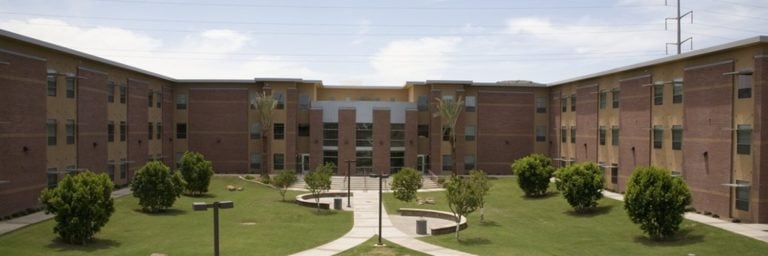
The many online degrees combine modern theory, industry standards, and experiential learning. The online BS in Artificial Intelligence is one of the first online bachelor's in the nation.
Learning is in the following ai research domains:
- Computer programming
- Building software systems
- Developing applications
- Applying theory and concepts to real-world problems
Graduates of the program have gained successful careers in:
- Architecture
- Autonomous systems
- Computer games
- Economics/market dynamics
- Sociology and more
Credit requirements: 120 total credits, with 30 credits specific to the major
Learning in ai research domains::
- Introduction to Databases
- Internet of Things
- Python Programming
- Linux Operating System
- Software Engineering Principles
- Deep Learning
- Augmented Reality
Online instruction style: Asynchronous
Ranking Guidelines and Methodology:
Successful Student has compiled this ranking from the student's point-of-view, factoring criteria that is important to students, such as AI instruction, variety of coursework, degrees offered, labs, and academic reputation.
More resources:
- The Best Online Computer Science Degree Programs
- The Best Online Artificial Intelligence Degrees
- The Best Online Machine Learning Master's Degrees
- How to Make ChatGPT Content Undetectable
- The Best Bachelor’s in Computer Science: Game Design Degrees
- The Best Online Video Game Design Colleges
- The Best Artificial Intelligence Journals
- The Best Online Data Analytics Degree Programs
- The Best Robotics Colleges
- The Best Online Degrees for Careers
- The Best Colleges for Cryptocurrency and Blockchain Education
Frequently Asked Questions
What is the best college degree for AI?
The degree that's best for AI would be a Computer Science degree with a specialization in Artificial Intelligence. There are also computer science degrees that specialize in AI and Machine Learning. Computer science degrees with specializations in AI are available as undergraduate and graduate degrees.
Is there a college degree for AI?
Yes, student's may pursue bachelor's and master's degrees in Artificial Intelligence, as online and on-campus degree options. The usual degree is a Computer Science degree with a specialization in Artificial Intelligence. These are available online and on-campus at colleges and universities across the United States but also in various schools across the world.
Is there a degree for Artificial Intelligence?
Yes, there are degrees for Artificial Intelligence. They are within Computer Science programs predominantly, and are often a specialization. There are also programs that offer Machine Learning degrees. These are sometimes within Data Science programs. Both Artificial Intelligence and Machine Learning programs are available online and on-campus at colleges and universities across the United States.
Are AI degrees worth it?
Given that Artificial Intelligence is a specialized degree, it is worth it to the extent that the job market needs Artificial Intelligence specialists, which it does. For Computer Science majors, it's a good degree specialization for this reason, and for the fact that it sets the Computer Science graduate apart for careers in Computer Science and Artificial Intelligence after graduating.
Artificial Intelligence is set to be the future of industry. This includes machine learning, engineering and game design.
Machine Learning is often used in the context of Data Analytics, in which large data sets are made meaningful. This information can contribute to decision-making. Machine Learning Engineering is a growing field which makes use of AI and Data Science. Machine Learning Engineers take large data sets and implement AI programs to determine answers and make predictions from data sets.
Engineering: AI is used in developing optimization methods and implementing algorithms in software. AI software engineers work closely with Robotics industries to create robots that can think and respond to their physical environments.
Game Design: AI occurs when machines learn and adapt to different circumstances and environments. Responding and adapting happens often in video games. Game Designers use AI as an important tool when developing commercial games.
An example of this is when non-player characters (characters not controlled by anyone) respond and adapt to the changing circumstances within a game. These characters are driven by the game's AI engine.
